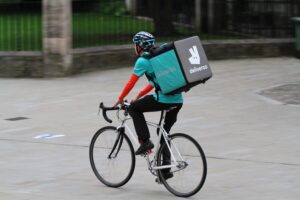
More than half of gig economy workers in the UK are earning less than the minimum wage, new research has found, with a quarter reporting that the nature of their work put their safety at risk.
In a study led by the University of Bristol, gig economy workers whose jobs included food delivery, private-hire driving and data entry were asked to report their earnings and working conditions: 52% of respondents reported earning less than the minimum wage, with the median respondent earning £8.97 an hour – 53p less than the minimum wage, which was £9.50 at the time of the research.
Of the 510 people questioned, more than 75% also reported experiencing work-related insecurity and anxiety.
Alex Wood, lead author of the study, said: “The findings highlight that working in the UK gig economy often entails low pay, anxiety and stress. As food, fuel and housing costs keep rising, this group of workers is especially vulnerable and needs to be more adequately remunerated and better protected.”
More than a quarter of respondents felt they were risking their health or safety by engaging in gig economy work, and a quarter reported experiencing pain as a result. In addition, 40% felt there was a chance they would lose their ability to make a living on their main digital platform and become unemployed in the next 12 months.
Wood said: “The self-employed who are dependent on platforms to make a living are urgently in need of labour protections to shield them against the huge power asymmetries that exist in the sector. This clearly warrants the expansion of the current ‘worker’ status to protect them.”
The gig economy is made distinct from traditional forms of freelance work by its reliance on digital platforms, most commonly used by drivers and delivery people. The long periods of time workers spend logged into such platforms, waiting or looking for work, was found to be a major factor contributing to low pay rates.
“Not only is the work low paid, but it is also extremely insecure and risky,” Wood said.
When asked what would improve their situation, respondents most commonly wanted minimum wage rates, holiday and sick pay, as well as protection against unfair dismissal.
Nader Awaad, an Uber driver and chair of the United Private Hire Drivers branch of the Independent Workers’ Union, said members often echo these requests. “I meet drivers that look like zombies. They tell me: ‘I’m doing 15, 18 hours a day to earn a living’,” he said.
“From a health and safety perspective, it’s a risky business. But people need to earn money to survive.”
The report found that support for trade unions was greater than previously found for non-union UK workers generally, with majorities of respondents willing to join or organise a union.
Awaad said his union has seen an increase in membership among private-hire drivers, but said they were reluctant to take action due to the loss of earnings associated with strikes or protests. “They feel like second-class citizens and like no one cares about them,” he said
Read more:
Over half of UK gig economy workers earn below minimum wage





